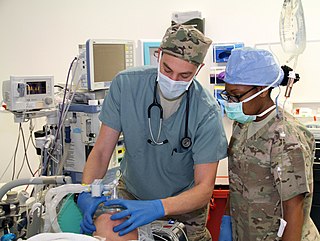
Apprenticeship is a system for training a new generation of practitioners of a trade or profession with on-the-job training and often some accompanying study. Apprenticeships can also enable practitioners to gain a license to practice in a regulated occupation. Most of their training is done while working for an employer who helps the apprentices learn their trade or profession, in exchange for their continued labor for an agreed period after they have achieved measurable competencies. Apprenticeship lengths vary significantly across sectors, professions, roles and cultures. In some cases people who successfully complete an apprenticeship can reach the "journeyman" or professional certification level of competence. In other cases they can be offered a permanent job at the company that provided the placement. Although the formal boundaries and terminology of the apprentice/journeyman/master system often do not extend outside guilds and trade unions, the concept of on-the-job training leading to competence over a period of years is found in any field of skilled labor.
A journeyman is a worker, skilled in a given building trade or craft, who has successfully completed an official apprenticeship qualification. Journeymen are considered competent and authorized to work in that field as a fully qualified employee. They earn their license by education, supervised experience and examination. Although journeymen have completed a trade certificate and are allowed to work as employees, they may not yet work as self-employed master craftsmen.
Abitur is a qualification granted at the end of secondary education in Germany, Lithuania, and Estonia. It is conferred on students who pass their final exams at the end of ISCED 3, usually after twelve or thirteen years of schooling. In German, the term Abitur has roots in the archaic word Abiturium, which in turn was derived from the Latin abiturus.
A radiation oncologist is a specialist physician who uses ionizing radiation in the treatment of cancer. Radiation oncology is one of the three primary specialties, the other two being surgical and medical oncology, involved in the treatment of cancer. Radiation can be given as a curative modality, either alone or in combination with surgery and/or chemotherapy. It may also be used palliatively, to relieve symptoms in patients with incurable cancers. A radiation oncologist may also use radiation to treat some benign diseases, including benign tumors. In some countries, radiotherapy and chemotherapy are controlled by a single oncologist who is a "clinical oncologist". Radiation oncologists work closely with other physicians such as surgical oncologists, interventional radiologists, internal medicine subspecialists, and medical oncologists, as well as medical physicists and technicians as part of the multi-disciplinary cancer team. Radiation oncologists undergo four years of oncology-specific training whereas oncologists who deliver chemotherapy have two years of additional training in cancer care during fellowship after internal medicine residency in the United States.

Anesthesiology is the medical specialty concerned with the total perioperative care of patients before, during and after surgery. It encompasses anesthesia, intensive care medicine, critical emergency medicine, and pain medicine. A physician specialized in anesthesiology is called an anesthesiologist. There are different ways of referring to the field of anesthesiology and physicians who specialize in it depending on the region of the world.
Education in Greece is centralized and governed by the Ministry of Education and Religious Affairs at all grade levels. The Ministry exercises control over public schools, formulates and implements legislation, administers the budget, coordinates national level university entrance examinations, sets up the national curriculum, appoints public school teaching staff, and coordinates other services.
A patent attorney is an attorney who has the specialized qualifications necessary for representing clients in obtaining patents and acting in all matters and procedures relating to patent law and practice, such as filing patent applications and oppositions to granted patents. The term is used differently in different countries, and thus may or may not require the same legal qualifications as a general legal practitioner.

A Pharmacy Technician is a title-protected, licensed health care provider who performs pharmacy-related functions, working collaboratively with a licensed pharmacist.

The South African Institute of Chartered Accountants (SAICA), is a professional accountancy body in South Africa.

Paramedics in Germany are the main providers of emergency care in emergency medical services in Germany. There exist two professional levels regulated by federal law, the Rettungsassistent and the Notfallsanitäter.

A medical laboratory scientist (MLS) or clinical laboratory scientist (CLS) or medical technologist (MT) performs diagnostic testing of blood and body fluids in clinical laboratories. The scope of a medical laboratory scientist's work begins with the receipt of patient or client specimens and terminates with the delivery of test results to physicians and other healthcare providers. The utility of clinical diagnostic testing relies squarely on the validity of test methodology. To this end, much of the work done by medical laboratory scientists involves ensuring specimen quality, interpreting test results, data-logging, testing control products, performing calibration, maintenance, validation, and troubleshooting of instrumentation as well as performing statistical analyses to verify the accuracy and repeatability of testing. Medical laboratory scientists may also assist healthcare providers with test selection and specimen collection and are responsible for prompt verbal delivery of critical lab results. An estimated 70% of medical decisions are based on laboratory test results.
An admission to practice law is acquired when a lawyer receives a license to practice law. In jurisdictions with two types of lawyer, as with barristers and solicitors, barristers must gain admission to the bar whereas for solicitors there are distinct practising certificates.
Following is a partial list of professional certifications in financial services, with an overview of the educational and continuing requirements for each; see Professional certification § Accountancy, auditing and finance and Category:Professional certification in finance for all articles. As the field of finance has increased in complexity in recent years, the number of available designations has grown, and, correspondingly, some will have more recognition than others. Note that in the US, many state securities and insurance regulators do not allow financial professionals to use a designation — in particular a "senior" designation — unless it has been accredited by either the American National Standards Institute or the National Commission for Certifying Agencies.
Fellow of the Royal Australasian College of Physicians, abbreviated as the post-nominal initials FRACP, is a recognition of the completion of the prescribed postgraduate specialist training programme in internal adult or internal paediatric medicine of the Royal Australasian College of Physicians.
A clinical coder – also known as clinical coding officer, diagnostic coder, or medical coder – is a health information professional whose main duties are to analyse clinical statements and assign standard codes using a classification system. The data produced are an integral part of health information management, and are used by local and national governments, private healthcare organizations and international agencies for various purposes, including medical and health services research, epidemiological studies, health resource allocation, case mix management, public health programming, medical billing, and public education.

A certified teacher is an educator who has earned credentials from an authoritative source, such as the government, a higher education institution or a private body or source. This teacher qualification gives a teacher authorization to teach and grade in pre-schools, primary or secondary education in countries, schools, content areas or curricula where authorization is required. While many authorizing entities require student teaching experience before earning teacher certification, routes vary from country to country.

The National Examination Board in Occupational Safety and Health is a UK-based examination board offering qualifications and courses in health, safety, environment and well-being management.

The average member of the United States Navy's Sea, Air, Land Teams (SEALs) spends over a year in a series of formal training environments before being awarded the Special Warfare Operator Naval Rating and the Navy Enlisted Classification (NEC) O26A Combatant Swimmer (SEAL) or, in the case of commissioned naval officers, the designation 113X Special Warfare Officer. All Navy SEALs must attend and graduate from their rating's 24-week "A" School known as Basic Underwater Demolition/SEAL (BUD/S) school, a basic parachutist course and then the 26-week SEAL Qualification Training program.
Steuerberater (StB) is the professional license for tax advisors in Germany.
The Brevet de technicien supérieur (BTS) senior technologist’s certificate is a national diploma of higher education in France, established in 1959.








